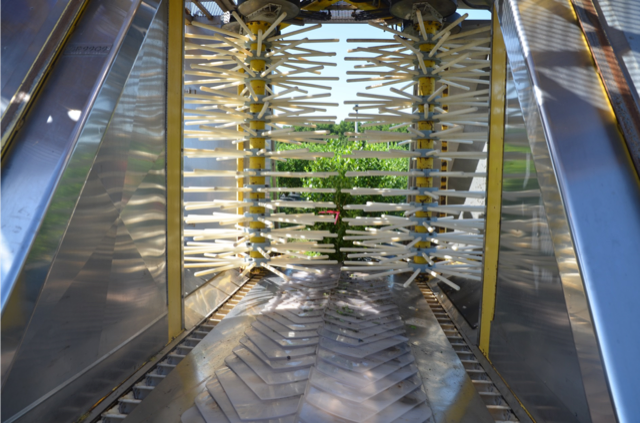By Yiannis Ampatzidis Vegetable growers face several serious challenges with respect to farm labor. The number of domestic farmworkers has decreased substantially. In some cases, growers are unable to fully harvest their marketable fruit. A high percentage of the remaining domestic workers are not legally authorized to work in the United States. The costs to recruit temporary foreign agricultural guest …
Spanish Version of Blueberry App a Benefit for Florida Industry
By Clint Thompson A new Spanish version of the University of Florida Institute of Food and Agricultural Sciences Blueberry Growers Guide app will benefit a plethora of workers within the industry. Doug Phillips, University of Florida Institute of Food and Agricultural Sciences (UF/IFAS) blueberry Extension coordinator, discusses its importance. “There’s a lot of growers, farm managers, field crew where English …
Machine Harvest Development Key to Sustainability of Specialty Crops
By Clint Thompson Machine harvesters are a key to Southeast farming operations remaining sustainable for the foreseeable future. More research funding is needed so scientists like Changying (Charlie) Li, professor in the University of Georgia School of Electrical and Computer Engineering, can develop advancements for specialty crop producers. “Imagine if we don’t need any labor, just deploy the robots and …
UF/IFAS Researchers Creating an ‘Artificial Intelligence Connoisseur’
A computer may not be able to taste a tomato or blueberry, but it can tell University of Florida Institute of Food and Agricultural (UF/IFAS) scientists which volatiles in those fruits make them taste good. UF/IFAS breeder and geneticist Marcio Resende wants to create what he calls an “Artificial Intelligence Connoisseur,” a model that tells researchers which chemical compounds produce …
‘Smart’ Greenhouses Could Cut Power Expenses
An internet-connected lighting system for greenhouses could reduce a farmer’s power bill, according to University of Georgia research. The study showed that a predictive lighting control system could optimize lighting for plants by predicting sunlight and only utilizing lights when necessary. Farmers could reduce their greenhouse electrical costs by as much as 33% by optimizing their lights. Plants are given …
Driverless Technology Rapidly Rolling Toward Reality
There was a truck driver shortage before COVID-19, but the pandemic certainly compounded the problem. Trucking is just one link in the supply chain that has been greatly disrupted in the past couple of years, but it is a critical one required to move goods across the country. Fruit and vegetable growers that need to transport their produce know the …
Blueberry App Puts Information at Growers’ Fingertips
By Doug Phillips The University of Florida Institute of Food and Agricultural Sciences (UF/IFAS) blueberry breeding program has developed a phone app resource that includes several tools for Florida blueberry growers. It is available for download on both iOS and Android systems. Blueberry breeder Patricio Muñoz developed the idea for the UF/IFAS Blueberry Growers Guide app. He had a vision …
Intelligent Disease Identification
By Yiannis Ampatzidis and Pamela Roberts Accurate and rapid disease identification at the beginning of an outbreak is essential for implementing effective management tactics. Diagnosis based on visual symptoms is often compromised by the inability to differentiate among similar symptoms caused by plant pathogens and abiotic disorders. Recent technological advances in sensors, machine vision, mechatronics, big data analytics and artificial …
Smart Spray Technology for Weed Control in Row Middles
By Nathan Boyd and Arnold Schumann Would you be willing to reduce herbicide inputs if it did not negatively impact your bottom line, required no additional labor, and weeds were still adequately controlled? For most growers, the answer would automatically be yes if it was possible. How the Technology Works University of Florida Institute of Food and Agricultural Sciences (UF/IFAS) …
The Future of Precision Weed Control
By Yiannis Ampatzidis Farmers use mainly agrochemicals for weed control and follow conventional crop protection strategies that use a vast amount of chemicals, despite some negative impacts on the environment and human health. More than 90% of the acreage of crops in the United States is sprayed with herbicides. It is estimated that around $31.5 billion was spent on herbicides …










